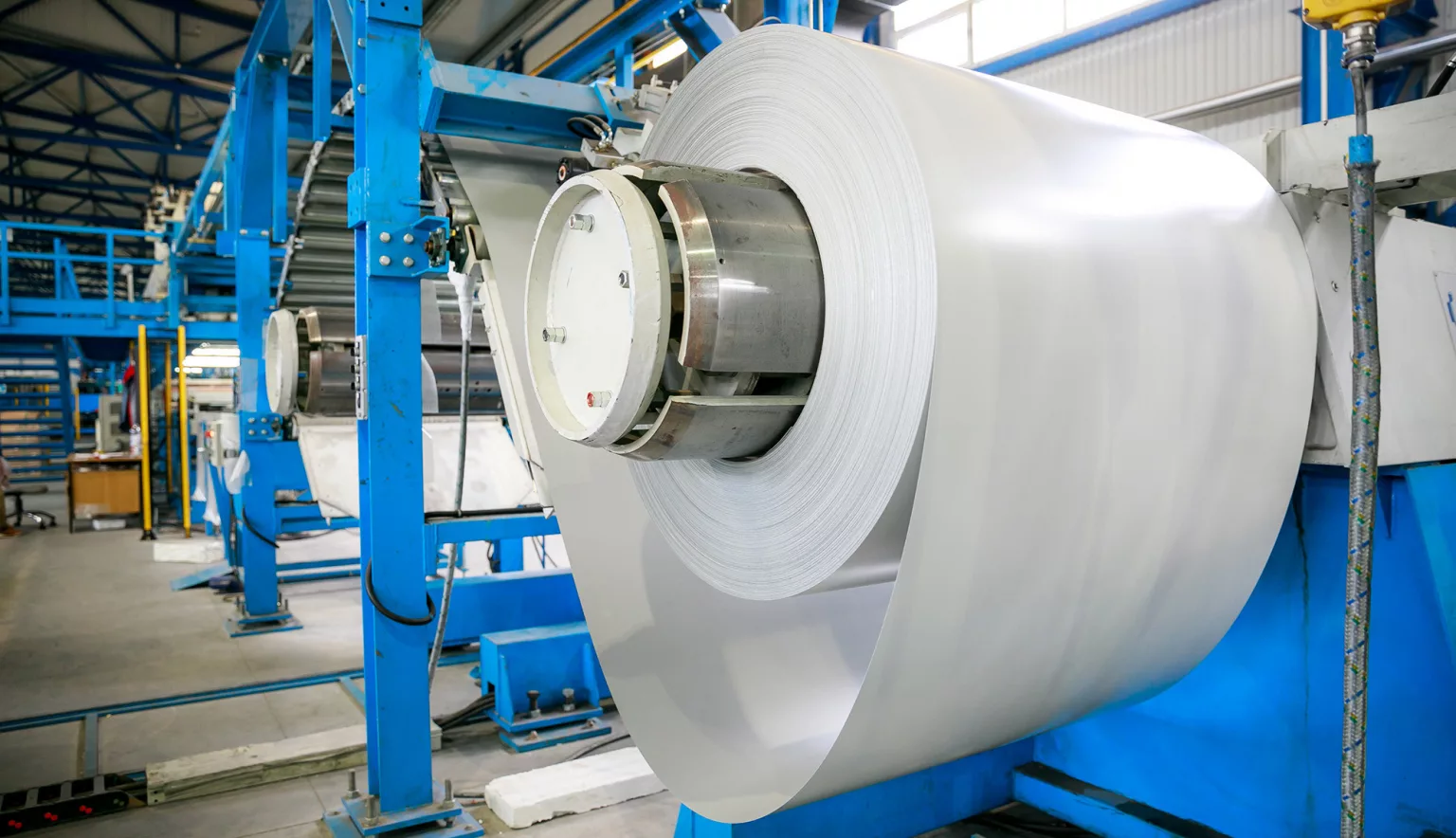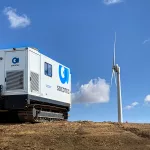From developing state-of-the-art polymer applications and delivering critical utilities networks for the Romanian population to grassroots empowerment initiatives and an impressive investment strategy, TeraPlast Group continues to consolidate its position as a leading figure in European manufacturing.
PRODUCTS WITH PURPOSE
You wake up. You walk to the bathroom and maybe use the toilet, then flushing and washing your hands before climbing in the shower, welcomed by a stream of warm water. You dry yourself off and dress yourself before filling up the kettle and making a morning coffee.
Maybe you make some breakfast too, and eat it, before washing the dishes and running the tap to brush your teeth. You go to the fridge and pull out some pasta for lunch that was boiled the night before, put on some shoes and head out of the door to work after a quick glass of water…
Water. It’s easy to take it for granted when it’s available at the turn of a tap. But what if it wasn’t? You wouldn’t be able to function, right?
According to a report from UNICEF and the World Health Organization, some three in 10 people worldwide, or 2.1 billion, lack access to safe and readily available water at home, while six in 10, or 4.5 billion, lack safely managed sanitation.
We’ve seen huge progress in many of the UN’s 17 Sustainable Development Goals, but goal number six – to ensure the availability and sustainable management of water and sanitation for all – remains arguably the most off track, posing problems far beyond the most underdeveloped countries.
“The Romanian market is behind any other EU country in every construction metric – just over half of its population have access to sewage networks, and roughly 40 percent don’t have access to water networks, for example,” explains Alexandru Stanean, shining a light on the scale of the problem in Romania.
The country, like many others, is facing an uphill battle. Yet there are promising players making headway in tackling the challenge that Stanean presents, TeraPlast Group – a local Bistrita-based organisation that he heads up as its CEO – being one such entity.
“TeraPlast Company, the largest entity of the Group, is currently the leading polyvinyl chloride (PVC) processor in Romania, producing sewage systems, supply and distribution systems for water and gas, electric cable protection systems and rainwater and wastewater management systems,”
he reveals.
“For these applications, the most cost-effective solutions are provided by plastic products, which makes our market potential huge.”
AN INSPIRING CULTURE
Not only a leader in all things PVC via TeraPlast Company, TeraPlast Group has in fact established a reputation as the largest Romanian construction materials producer.
So how has it successfully consolidated such a revered status? For Stanean, the answer is multifaceted.
“We have a wide experience and a longstanding history that allowed us to develop into a solid group, being either the leader or among the top five players in each of the market segments that we operate,” he explains.
“Our business has been built over time, where we’re now innovators in the market. That is the case with our subsidiary Politub when it began producing polyethylene pipes; with our multilayer PVC pipes; with the incorporation of recycled PVC in pipes.
“We have a strong, experienced team that shares the company’s vision and a dedicated, highly active research department that focuses on improving the product portfolio. And we have the knowhow, the strength and stability to stay true to our vision, promises and objectives even if the market is not at its best.”
TeraPlast Company’s public listing on the Bucharest Stock Exchange in July 2008 provides confirmation of this esteemed reputation, its IPO having been one of the most successful of any privately owned business for many years after successfully increasing market cap in a difficult macroeconomic environment during the advent of the global economic crash.
Looking at the organisation’s more recent history, meanwhile, a stream of key milestones achieved in the past three years alone further unveil an unquestionably ambitious character.
2017 marked the acquisition of Politub (a leading Romanian pipe supplier) and majority purchase of Wetterbest (a local leader in complete roofing systems), as well as the inauguration of TeraSteel Serbia – the first production unit with private Romanian capital opened abroad since 1990.
2018 then saw the group become Romania’s largest rigid PVC recycler and among the top 10 in Europe by processing capacity, the signing of a state aid co-financing agreement for three investment projects aimed at expanding production capacities worth €15 million, and building commence on a photovoltaic plant that will cover approximately 11 percent of the TeraPlast Industrial Park’s energy requirements.
And 2019 witnessed a stake increase in Wetterbest to 99 percent, the launch of a host of new products, and internal development investments totaling €23 million at group level.
“Materials and product formulations evolve constantly, and we strive to improve our range accordingly,” Stanean states, eluding to this latter point. “We now have recycled PVC in our sewage pipes and are producing upgraded polyethylene pipes for water networks with crack resistance materials and protective polypropylene layers.
“In fact, I can confidently say that our entire product portfolio has been upgraded in the last four or five years.”
IN PURSUIT OF EMPOWERMENT
A mere glance at the recent progress of the group that is currently in its 124th year of operation (TeraPlast Company was founded in 1896) provides a good idea of the pace of innovation that has come to epitomise it.
That said, TeraPlast Group is not solely defined by its bold investment strategy. The company’s industry leading workforce is likewise critical to its overall success, each staff member carefully hired, cultivated and retained through a variety of employee-centric initiatives.
“Identifying the right, qualified workforce represents a challenge in our sector,” the CEO explains.
“We are constantly developing our recruiting and training programmes that aim to attract and retain employees as well as align to their expectations. TeraPlast and Wetterbest are licensed personnel trainers, and we offer fair wages in accordance with the national average for the industry and an attractive benefits package.”
Indeed, the results of the endeavours speak for themselves, many of the organisation’s workers having been part of the group for 15, even
20 years or more.
“Our dedication to Romania doesn’t end here either,” Stanean adds.
“Our mission is to offer efficient solutions for people and the environment, not only through employee engagement or by building critical utilities networks for the entire population, but equally through a CSR strategy that is based on three main pillars and a dedicated platform – Building Romania Together.”
The first of these is education, the group supporting initiatives that aim to facilitate access not just to learning, but to the right kind of educational environments. Second is empowering equal opportunities by partaking in actions that deliver healthy social environments that help to provide a decent quality of life for everyone. And third is health and the environment, the organisation harbouring responsible attitudes towards environmental and sporting activities.
“In 2018, we were the main sponsor for a local handball team with great national results, and took part in the Fed Cup tennis tournament and the International Mathematics Olympiad, and collaborated with Habitat for Humanity in their BIG BUILD project of building houses for the people in need,” Stanean reveals, affirming examples of these efforts in practice.
MAKING INROADS
Talk of these past commitments turns attentions to the future, Stanean proceeding to ponder what’s in store for TeraPlast Group next.
Here, he once again eludes to the ongoing production capacities expansion investments as a new chapter in the firm’s ongoing development, set to lay the foundations from which its brands will become better represented in the market.
“We’re looking to strengthen our geographical footprint by bolstering our distribution network while offering the same high-quality products and services across each new market,” the Chief Exec adds. “Going beyond this, we are working to develop new sustainable solutions while at the same time diversifying our product portfolio.”
Indeed, the potential for the enterprise to make inroads remains massive.
The sheer fact that only 50.8 percent of Romanian homes are currently connected to sewage networks will keep TeraPlast busy for the coming years. Yet, at the same time, there are other opportunities emerging.
“The new constructions segment rose by 28.5 percent in the first eight months of 2019 compared to the same period of 2018, indicating a healthy market for the PVC windows and doors segment of the group that has been carried into the near year,” Stanean affirms, providing a concluding outlook.
“We do, however, want to capitalise on these opportunities in the right way, and that is why we’re paying greater attention to the way in which we are managing PVC waste.
“According to our estimations, approximately 100,000 tonnes of PVC are being buried in Romania every year. This in mind, the efficient management of the PVC waste should be a much more important topic on the public agenda, just like sustainability in terms of construction materials and emissions.
“Our ambitions are diverse, but this is an area that we’ll truly be looking to spearhead as we move through 2020 and beyond.”
























